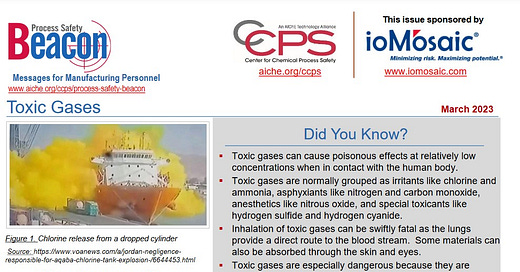Every month the Center for Chemical Process Safety (CCPS) publishes its ‘Process Safety Beacon — Messages for Manufacturing Personnel’. This month’s Beacon is Toxic Gases. It describes a fatal accident that occurred in Aqaba, Jordan in June 2022.
The Chlorine Release
The following is from the incident description.
On June 27, 2022, a 25-ton isotainer of liquefied chlorine gas was being loaded onto a ship by a crane in Aqaba, Jordan. A lifting cable snapped, and the tank crashed onto the ship’s deck and ruptured. A huge cloud of toxic yellow chlorine gas formed and workers evacuated the area. Thirteen people were killed and about 300 others were hospitalized.
Officials stated the tank’s weight was “three times more than the cable load capacity,” and the required safety measures for dealing with such hazardous material were not in place. No qualified person was on the deck at the time to check the lifting equipment and procedures.
Experts said the incident could have become a catastrophe had dozens of workers ending a shift not left the site shortly before the leak. Fortunately, winds also blew the toxic gas away from populated areas in the port city to the outlying desert.
Precautions should be taken during chemical unloading operations in case of leaks, whether the materials are solids, liquids or gases. In this case, there were a number of people close to the loading area who did not need to be there at the time of the incident.
Removing People
I have highlighted the sentence to do with people just having left the site because it illustrates one of the principles of inherent safety: elimination of the hazard.
One of the founders of modern process safety — Trevor Kletz — famously said, “What you don’t have can’t leak”. I picked up on this idea, and used to create the aphorism, “If a man’s not there, he can’t be killed”.
Trevor himself understood this principle. One of the events that launched his career as a process safety leader was the Flixborough disaster that occurred in England in the year 1974. The explosion, which killed 28 people and injured 36 others, occurred on a weekend. Had it occurred during the work week, the number of fatalities would have been much higher.
We see the same way of thinking applied almost every year with regard to oil and gas operations in the Gulf of Mexico. Typically, three or four destructive hurricanes enter the Gulf each year. These hurricanes can and do cause serious damage to platforms. Yet the number of people who are killed or injured is zero because the platforms are evacuated well before the hurricane arrives.
(The lesson learned to do with removing people was brought home to me at a chemical plant site I worked at. The facility had just had a serious accident. Following the rebuild of the destroyed equipment, a group of managers assembled to watch the startup of the new equipment. While they were standing there a pipe gasket failed. A large stream of hot caustic shot into the air. Fortunately, the jet was directed away from the assembled managers. Had it been directed toward them the number of injuries would have been greater than in the original accident. It was understandable that the managers wanted to see their new investment in action. But they really shouldn’t have been there.)






